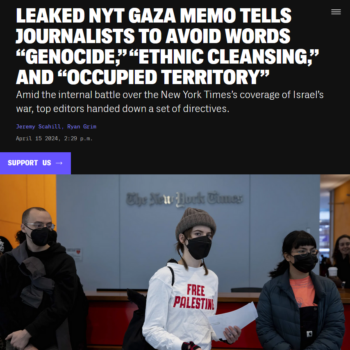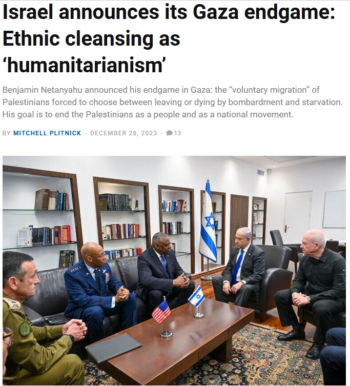New York Times editors issued a memo to staffers that warned against the use of “inflammatory language and incendiary accusations on all sides”—but the instructions offered by the memo, which was leaked to the Intercept (4/15/24), seemed designed to dampen criticism of Israel’s actions in Gaza and to reinforce the Israeli narrative of the conflict.

Caption from FAIR: ”A New York Times staffer told the Intercept (4/15/24) that the paper was ‘basically taking the occupation out of the coverage, which is the actual core of the conflict.’“ Credit: FAIR
Among the terms the memo tells Times reporters to avoid: “Palestine” (“except in very rare cases”), “occupied territories” (say “Gaza, the West Bank, etc.”) and “refugee camps” (“refer to them as neighborhoods, or areas”).
These are all standard terms: “Palestine” is the name of a state recognized by the United Nations and 140 of its 193 members. The “occupied territories” are the way Gaza and the West Bank are referred to by the UN as well as the United States. “Refugee camps” are what they are called by the UN agency that administers the eight camps in Gaza.
The memo discourages the use of the terms “genocide” (“We should…set a high bar for allowing others to use it as an accusation”) and “ethnic cleansing” (“another historically charged term”).
Genocide is defined by the Genocide Convention as certain “acts committed with intent to destroy, in whole or in part, a national, ethnical, racial or religious group, as such.” These acts include “killing members of the group” and “deliberately inflicting on the group conditions of life calculated to bring about its physical destruction in whole or in part.” The International Court of Justice ruled in January that it was “plausible” that Israel was in violation of the Genocide Convention (NPR, 1/26/24). A US federal judge has likewise held that “the current treatment of the Palestinians in the Gaza Strip by the Israeli military may plausibly constitute a genocide in violation of international law” (Guardian, 2/1/24).

Caption from FAIR:“'Our problem is not allowing the exit, but a lack of countries that are ready to take Palestinians in,' Netanyahu told a Likud ally (Mondoweiss, 12/28/23) 'And we are working on it.' At the New York Times, you aren’t supposed to call this “ethnic cleansing.” Credit: FAIR
“Ethnic cleansing” does not have a legal definition, but surely the Israeli military campaign that has displaced 85% of Gaza’s population, while Israeli Prime Minister Benjamin Netanyahu promises he is “working on” the “voluntary emigration” of that population (Mondoweiss, 12/28/23), qualifies under any reasonable standard.
In contrast to its take on “genocide” and “ethnic cleansing,” the memo contends that “it is accurate to use ‘terrorism’ and ‘terrorist’ in describing the attacks of October 7″; the words “fighters” or “militants,” however, are discouraged for participants in those attacks. This is the opposite of the approach taken by outlets like AP (X, formerly Twitter, 1/7/21) and the BBC (10/11/23); John Simpson, world affairs editor for the latter, calls “terrorism” a “loaded word, which people use about an outfit they disapprove of morally.”
Also on the Times‘ list of approved language: “the deadliest attack on Israel in decades.” Reporters are apparently not offered any superlatives to use to describe the Israeli assault on Gaza, such as “among the deadliest and most destructive in history” (AP, 12/21/23), or the most “rapid deterioration into widespread starvation” (Oxfam, 3/18/24), or “the biggest cohort of pediatric amputees in history” (New Yorker, 3/21/24).
“Our goal is to provide clear, accurate information, and heated language can often obscure rather than clarify the fact,” says the memo, written by Times standards editor Susan Wessling and international editor Philip Pan, along with their deputies. “Words like ‘slaughter,’ ‘massacre’ and ‘carnage’ often convey more emotion than information. Think hard before using them in our own voice.” The memo asks, “Can we articulate why we are applying those words to one particular situation and not another?”
As FAIR noted in a new study (4/17/24), the Times does apply “heated language” in a decidedly lopsided manner. When Times articles used the word “brutal” to describe a party in the Gaza conflict, 73% of the time it was used to characterize Palestinians. An analysis by the Intercept (1/9/24) of Gaza crisis coverage in the Times (as well as the Washington Post and Wall Street Journal) found that
highly emotive terms for the killing of civilians like “slaughter,” “massacre” and “horrific” were reserved almost exclusively for Israelis who were killed by Palestinians, rather than the other way around.
“Horrific” was used by reporters and editors nine times as often to describe the killing of Israelis rather than Palestinians; “slaughter” described Israelis deaths 60 times more than Palestinian deaths, and “massacre” more than 60 times.
ACTION:
Please ask the New York Times to revise its guidance on coverage of the Gaza crisis so that it is no longer banning standard descriptions and placing the most accurate characterizations of Israeli actions off limits.
CONTACT:
Letters: letters@nytimes.com
Readers Center: Feedback